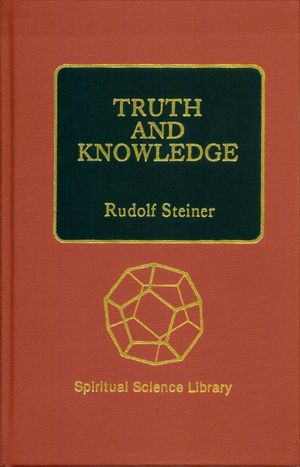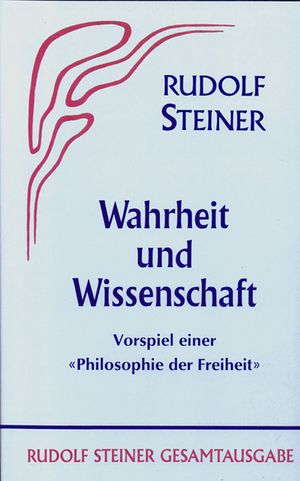GA 3


Truth and Knowledge - Introduction to the "Philosophy of Freedom"
Wahrheit und Wissenschaft - Vorspiel einer «Philosophie der Freiheit»
This dissertation by Rudolf Steiner on epistemology, first published in 1892 as an extended book edition, already deals with all the central points of his later main work, "The Philosophy of Freedom".
„The result of these investigations is that truth is not, as is usually assumed, the ideal reflection of some real thing, but a free product of the human spirit, which would not exist anywhere at all if we did not bring it forth ourselves. The task of cognition is not to repeat in conceptual form something that already exists elsewhere, but to create an entirely new realm which, together with the sensuously given world, only results in full reality. Thus the highest activity of man, his spiritual creation, is organically integrated into the general world event. Without this activity, world events could not be thought of as a self-contained whole. Man is not an idle spectator of the course of the world, figuratively repeating in his mind what takes place in the cosmos without his intervention, but the active co-creator of the world process; and cognition is the most complete link in the organism of the universe.
For the laws of our actions, for our moral ideals, this view has the important consequence that these too cannot be regarded as the image of something outside us, but as something that exists only within us. A power, as whose commandments we would have to regard our moral laws, is thus also rejected. We do not know a "categorical imperative", a voice from the beyond, as it were, which dictates to us what we must or must not do. Our moral ideals are our own free product. We only have to carry out what we prescribe to ourselves as the norm of our actions. The view of truth as an act of freedom thus also establishes a moral doctrine whose foundation is the completely free personality.“ (Lit.:GA 3, p. 11ff)
In the "practical conclusion" Rudolf Steiner summarises:
„It was the position of our cognizing personality in relation to the objective world-being about which we demanded clarification through the preceding considerations. What does the possession of knowledge and science mean to us? That was the question we sought to answer. We have seen that in our knowledge the innermost core of the world is lived out. The lawful harmony that governs the universe appears in human knowledge. It is therefore part of man's profession to bring the basic laws of the world, which otherwise dominate all existence but would never come into existence themselves, into the realm of appearing reality. This is the essence of knowledge, that in it the ground of the world, which can never be found in objective reality, presents itself. Our cognition is - figuratively speaking - a constant living into the world ground [...].
The realisation of this lawfulness for human action is only a special case of cognition. The views we have derived about the nature of cognition must therefore also be applicable here. To recognise oneself as an acting personality thus means: to possess as knowledge the corresponding laws, i.e. the moral concepts and ideals, for one's actions. If we have recognised this lawfulness, then our actions are also our work. The lawfulness is then not given as something that lies outside the object on which the action appears, but as the content of the object itself conceived in living action. The object in this case is our own ego. If the latter has really penetrated its action in a cognizant way, then it feels at the same time that it is the master of it. As long as this does not take place, the laws of action face us as something alien, they dominate us; what we accomplish is under the compulsion they exert on us. When they are transformed from such an alien being into the very own doing of our I, then this compulsion ceases. The constraint has become our own being. Lawfulness no longer rules over us, but in us over the events emanating from our ego. The realisation of an event by means of a lawfulness that stands outside the realiser is an act of unfreedom; that by the realiser himself is an act of freedom. To recognise the laws of one's action means to be conscious of one's freedom. The process of cognition is, according to what we have said, the process of development towards freedom.“ (Lit.:GA 3, p. 90ff)
On the relevance of the "practical conclusion", which was not yet included in the dissertation version of the work or was omitted, Rudolf Steiner expressed himself as follows in 1919:
„My whole development of epistemological concepts in my little book "Truth and Knowledge" finally, on the last and penultimate page, sounds out in this, that the human being is a scene for that which the cosmos actually does in him, and that he does it in connection with the cosmos, from the outside in, not from the inside out. It is the most important part, this last and penultimate page of my little book "Truth and Knowledge". And because these two pages are the most important and significant, because they reach most intensively into what needs to be changed in the conception of the present, that is why I was only able to formulate this writing, which was also my doctoral dissertation at the time, after the doctoral dissertation was over. In the form in which it was presented as a dissertation, these last two pages were missing; for science could not be expected to draw conclusions from these things which have a certain significance for the reshaping of the entire world view. The epistemological preparation was relatively harmless in the dissertation, for that is an objective philosophical development. But what it boiled down to, that could only be added in later print.“ (Lit.:GA 190, p. 60f)
Contents (selection)
- Kant's basic epistemological question.
- The starting point of epistemology
- Cognition and reality
- The presuppositionless epistemology and Fichte's Wissenschaftslehre
- The epistemological and practical conclusion
Literature
- Rudolf Steiner: Truth and Knowledge - Introduction to The Philosophy of Freedom, CW 3, Garber Communications, Inc. 1981, ISBN 0-89345-008-1
German
- Rudolf Steiner: Wahrheit und Wissenschaft. 5. Auflage. Rudolf Steiner Verlag, Dornach 1980, ISBN 3-7274-0030-7; Tb 628, ISBN 978-3-7274-6280-1 English: rsarchive.org German: pdf pdf(2) html mobi epub archive.org
Original editions
- Die Grundfrage der Erkenntnistheorie mit besonderer Rücksicht auf Fichte's Wissenschaftslehre. Prolegomena zur Verständigung des philosophierenden Bewusstseins mit sich selbst, Inaugural-Dissertation zur Erlangung der Doctorwürde von der Philosophischen Fakultät der Universität Rostock, vorgelegt von Rudolf Steiner, 1891 pdf (1891)
- Wahrheit und Wissenschaft. Vorspiel einer „Philosophie der Freiheit“, Herm. Weissbach, Weimar 1892 pdf (1892)
- Wahrheit und Wissenschaft. Vorspiel einer „Philosophie der Freiheit“, Philosophisch-Anthroposophischer Verlag am Goetheanum, Dornach 1925 pdf (1925)
 |
References to the work of Rudolf Steiner follow Rudolf Steiner's Collected Works (CW or GA), Rudolf Steiner Verlag, Dornach/Switzerland, unless otherwise stated.
Email: verlag@steinerverlag.com URL: www.steinerverlag.com. Index to the Complete Works of Rudolf Steiner - Aelzina Books A complete list by Volume Number and a full list of known English translations you may also find at Rudolf Steiner's Collected Works Rudolf Steiner Archive - The largest online collection of Rudolf Steiner's books, lectures and articles in English. Rudolf Steiner Audio - Recorded and Read by Dale Brunsvold steinerbooks.org - Anthroposophic Press Inc. (USA) Rudolf Steiner Handbook - Christian Karl's proven standard work for orientation in Rudolf Steiner's Collected Works for free download as PDF. |
